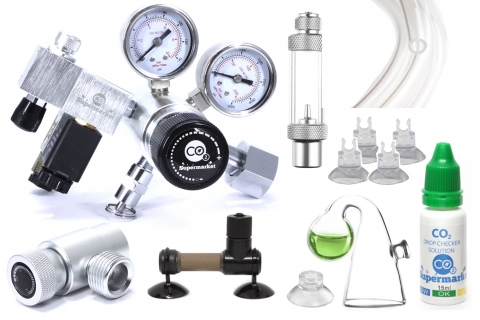DIY CO2 Kit Guide
Get great plant growth using one of our CO2 Systems
Instructions
The DIY CO2 Kit enables two different configurations:
DIY CO2 System Using Sugar / Yeast

The DIY CO2 Kit provides an excellent method of deploying the sugar/yeast solution to generate CO2. Simply mix your sugar and yeast solution in the bottles, screw the caps on the bottles and you have instant CO2.
One additional benefit is the ability to stagger your bottles, so every 10 days or so (or when you see the pressure dropping on the pressure gauge) one of the bottle solutions is changed for fresh mixture, in another 10 days the other bottle is refreshed. This staggering levels out the peaks and troughs that you normally get at the start and end of the cycle.
INSTRUCTIONS FOR DIY CO2 USING SUGAR AND YEAST
Add 1/2 teaspoon of yeast into a bottle
Add 2 Cups Sugar
Fill bottle with lukewarm water to 3/4 of the bottle
Add cap to the bottle
Shake well
Repeat for the second bottle.
Change 1 bottle every 10 days.
DIY CO2 System Using Citric Acid / Baking Soda

Another popular method of generating DIY CO2 is to use a citric acid (or vinegar) and baking soda (aka bicarbonate of soda, aka sodium bicarbonate).
The pressure in the bottles will want to form an equilibrium because they are connected by tubing. So when the pressure is higher in bottle A than in bottle B, gas will want to flow from A to B. A consequence of this is that citric acid is injected into bottle B when the pressure in bottle A becomes higher than that in bottle B, which in turn creates more CO2. This additional gas is pushed into bottle A (as well as your diffuser), again making an equilibrium but in reverse to before. When the pressure in B falls below A, citric acid is again pushed from A to B, and so the cycle continues. It's an ingenious system!
INSTRUCTIONS FOR DIY CO2 USING BAKING SODA AND CITRIC ACID
2 x 2L Plastic Bottles, e.g. Coke or Sprite.
Bottle A
200g Citric Acid Powder.
Mix with 600ml Water until dissolved.
Bottle B
200g Baking Soda
Mix with 200ml Water until dissolved.
To start, citric acid or vinegar is poured into bottle A, and a mixture of baking soda and water is poured in bottle B. The caps with tubing attached are then screwed onto the bottles.
The needle valve is opened, and bottle A is squeezed slightly to inject Citric Acid into bottle B. This starts the generation of CO2. The needle valve is then closed to allow pressure to build in the bottles.
Mix bottle B by swirling the mixture around - you should see some bubbling. If not, squeeze some more citric acid from bottle A.
When the pressure gauge reads 1.5 bar in bottle A you can slowly open the needle valve to begin the flow of CO2 to your diffuser.

Someone added a product to their cart
View ProductSomeone added a product to their cart
View Product




